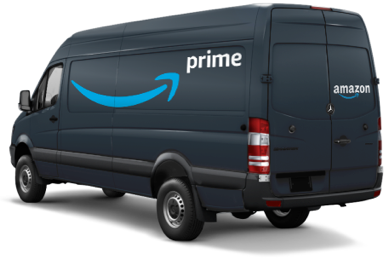Amazon has gotten flack in the past for some of the challenges its crowdsourced “last mile” delivery drivers face, but now it’s offering those with entrepreneurial ambitions the option to do more. Instead of showing up for gig work, drivers can opt for a new program where Amazon helps them to establish their own delivery business.
The program will include access to Amazon’s delivery technology, hands-on training, and discounts on a suite of assets and services, including the vehicle leasing and insurance. the retailer says.
That means drivers won’t have to use their own cars, as in the crowdsourced delivery program known as Amazon Flex. This gives them more space for organizing packages, the ability to use parking spots for delivery vehicles, and the ability to haul extra equipment, like straps and dollies.
Amazon says the earning potential for successful owners is as much as $300,000 in annual profit operating a fleet of 40 vehicles. The company expects that, over time, hundreds of small business owners will hire tens of thousands of delivery drivers across the U.S., it says.
In other words, Amazon just launched its own UPS competitor of sorts, by offering leased vans, training and resources to those who want to drive for Amazon instead of Uber.
 The retailer says people can start up their Amazon delivery businesses with as little as $10,000. Military vets can get that 10K reimbursed, as Amazon is investing a million into a program that funds their startup costs.
The retailer says people can start up their Amazon delivery businesses with as little as $10,000. Military vets can get that 10K reimbursed, as Amazon is investing a million into a program that funds their startup costs.
The business owners – who don’t need logistics experience, Amazon notes – will be offered discounts on the customized delivery vans, branded uniforms, fuel, comprehensive insurance coverage, and more – deals the retailer pre-negotiated on their behalf.
This also addresses some of the problems the gig work Flex drivers faced – gas prices would often cut far too much into profits; the lack of insurance; and the general challenges associated with trying to delivery packages from an unbranded, small car.
“We have great partners in our traditional carriers and it’s exciting to continue to see the logistics industry grow,” said Dave Clark, Amazon’s senior vice president of worldwide operations, in a statement about the launch. “Customer demand is higher than ever and we have a need to build more capacity. As we evaluated how to support our growth, we went back to our roots to share the opportunity with small-and-medium-sized businesses. We are going to empower new, small businesses to form in order to take advantage of the growing opportunity in e-commerce package delivery.”
The changes come at a time when there’s been debate about Amazon’s financial impact on the U.S. Postal Service. But with this new program, Amazon could reduce its reliance on outside partners as the program scales.
However, Amazon will continue to work existing partners, including UPS and FedEx, in addition to the USPS and smaller last-mile delivery partners, for some time. As Amazon’s business continues to grow, it will need these partners’ help to get packages to customers for the foreseeable future – a fleet of leased Prime vans can’t pick do it all.

